Working with a deep sense of purpose can be all-consuming. The ongoing battle for ‘better’ can be exhausting—neverending, even. It’s the kind of work that attracts passionate people whose drive and care for the work they do can sometimes come at a cost to their mental health.
Kylie Crane, Today’s Head of People, met with Dr Jo Mitchell, Clinical Psychologist and co-founder of The Mind Room to discuss how we might relieve the pressure, values-based recruitment, and humanity in HR.
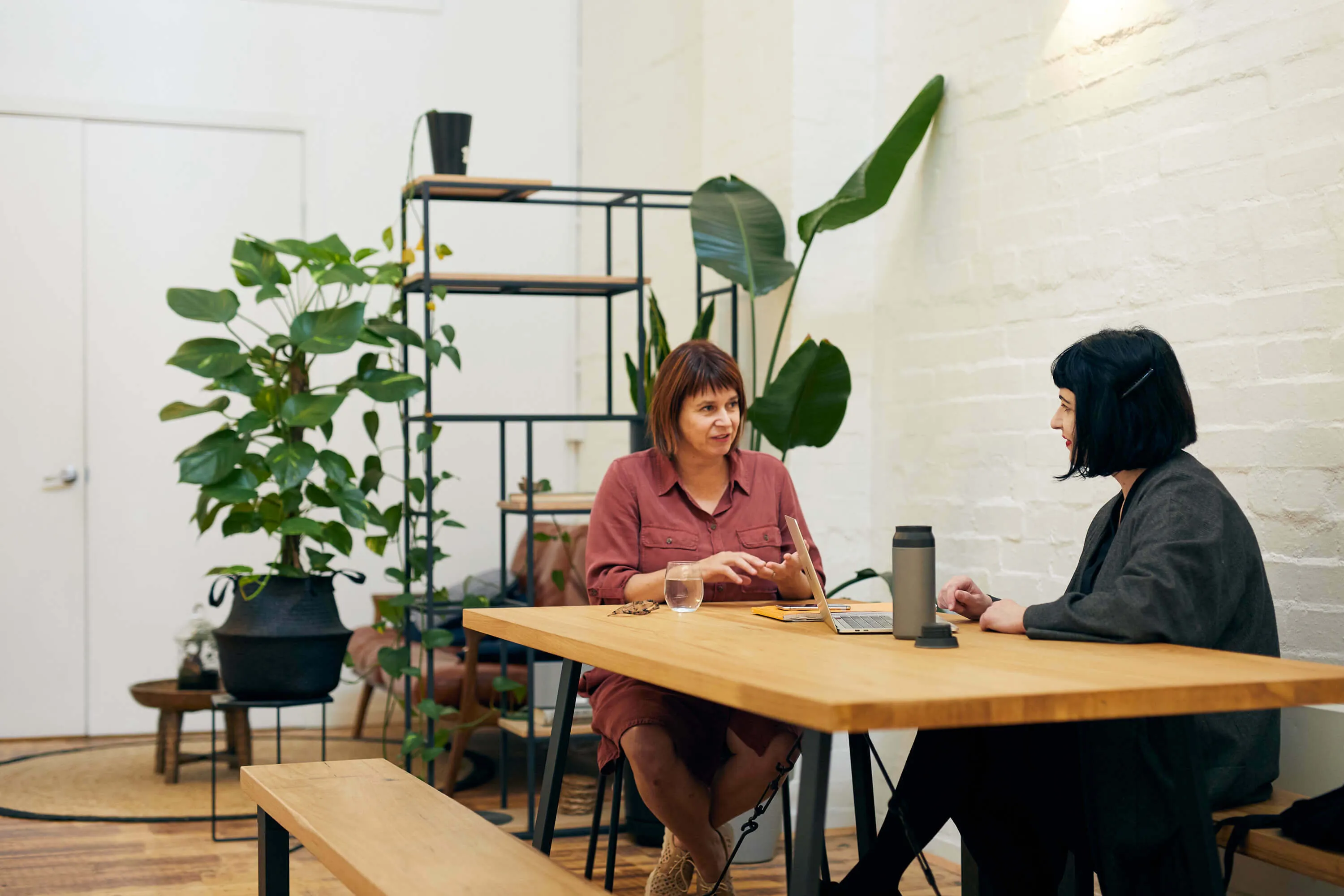
In conversation
Dr Jo Mitchell, Clinical Psychologist at The Mind Room
Kylie Crane, Head of People at Today
It's lovely to be sitting with you again, Jo, the last time we caught up was when you delivered a wellbeing workshop for the team, and I have to tell you that the feedback about the workshop has just been amazing. And it's been kept alive. People still reference a lot of the thinking and the tools that you shared. It's created a really good momentum when thinking about individual wellbeing, but also collective wellbeing across the studio, so thank you.
You're so welcome, and that makes me really happy to hear. If we can empower people to take charge of it, then that is exactly what we want.
For people that haven’t heard of The Mind Room before, can we start with a little about what it’s all about and what your role is?
The Mind Room is a health, wellbeing, and performance psychology community. Our big mission is really to help people to thrive; to live rich, rewarding, meaningful lives, whatever that looks like for them. Some people might come in here starting from a basis of having some kind of mental illness, but others might be coming in because they want to lift their performance. Particularly we work a lot with athletes and people from the sporting industry, but more recently we're stepping into the performing arts as well, and working with people there.
A lot of people have precursors to mental health issues—stress, chronic stress, difficulties going on in their life—so we help them navigate that. We think about, how do they find purpose, meaning, and direction in their own life?
Wonderful stuff and very helpful for lots and lots of people. What's your role at The Mind Room?
I am co-founder and director, but also a Clinical Psychologist. I see clients one-on-one, but those numbers are getting a little bit smaller these days.
I steer the strategic direction of where we want to go as a business, and adapt to the things that are going on in our environment that affect the way we're living as well. Thinking about things like technology and evidence-based science that comes through, and how as we’re learning more about these things, there’s a need for it to be translated into applications, and that's what we love to do. So I run the practise, keep our team moving forward, and try to have fun along the way.
Yep, it's so critical. It's something that we're really focusing in on at the moment, too—having fun.
Particularly in a purpose-driven organisation like Today, some of the problems that we are trying to solve with our clients are really tricky and difficult problems. Keeping the joy can sometimes be quite a challenging thing and we've been working on that recently as a priority.
When did you come to know that you wanted to work in this space? What drives you?
Jo: Thanks for asking that question. I don't get to share that very often. I actually didn't know what I wanted to do for a very long time ... I was a late bloomer.
The one big passion I did have was running and sport. I was an athlete for a lot of years, and then transitioned into working in the industry in a range of roles, and found myself working in the UK for British Olympics and looking after their marketing and media. And then that translated into an athlete transition program that was being brought over from Australia and embedded in the UK system.
I got to work on that, and what I found was I was getting to work more one-on-one with athletes and hear their stories, but whenever it was getting interesting, I had to pass them over to the Psychologist. So I was just like, “Goddammit.” I checked in with my values and what mattered to me at that point, and realised there were things that were missing.
I was ready to come back home to Australia, put myself through my clinical training in Adelaide and again as I did that, I realised, “Well, this is amazing. This is giving me an understanding of human pathology and dysfunction and what's going wrong with us.”
That time was also the beginning of this movement called the ‘Positive Psychology Movement’—really early days of that. So I had an opportunity to do a PhD and I did it in happiness and drawing wellbeing for people.
The catalyst of those two worlds really has been the start of The Mind Room, and understanding how we can deliver these messages in our individual sessions, but also at a group population level as well.
What made you decide to start your own business rather than going into practice or continue working in sport?
I worked in a range of different settings, but always had a little bit of private practice on the side. I worked for somebody else, then worked for myself, which was incredibly lonely work. Going back and thinking about what made me really thrive in a workplace, I realised even though I'm spending the day with people, as in I'm seeing clients and you're with someone, you're actually not connected.
It's a different relationship.
Absolutely. Through talking to others in the industry I realised that a lot of us were feeling that way, and learnt that the reason why people were exiting private psychology work was that lack of connection, so practitioners were going back to places where they could get it. I was talking with my business partner, Michael, about it, and we just said, “Well, there's no reason why we can't do that in private practice. It's just that nobody's done it before.”
We've tended to follow this very medical model of delivery of health services, but we don't need to do that. We need to be credible and deliver a quality service, but we can bring the warmth, the humanity, and the social connection for both our clinicians and our clients. So that was the genesis of The Mind Room.
We wanted to do it differently and we wanted to make it more human for everybody, really.
Fantastic. I think that's the feedback that we've received from people who access The Mind Room for EAP services, as well the workshop that you delivered for us last year and the resources you have provided; it felt so human and so real.
A lot of the time we're just reassuring people that they're normal. Because nobody's actually taught them what a normal mind or normal behaviour looks like. We have a lot of social messages about what's appropriate and what's not, but that's different to knowledge about “this actually is an indication of illness”, or that you're struggling in some way. We just want people to understand the mechanics of their mind and body so they’re empowered to live the life that works for them.
We need to be credible and deliver a quality service, but we can bring the warmth, the humanity, and the social connection for both our clinicians and our clients. So that was the genesis of The Mind Room. We wanted to do it differently and we wanted to make it more human for everybody, really.
Dr Jo Mitchell
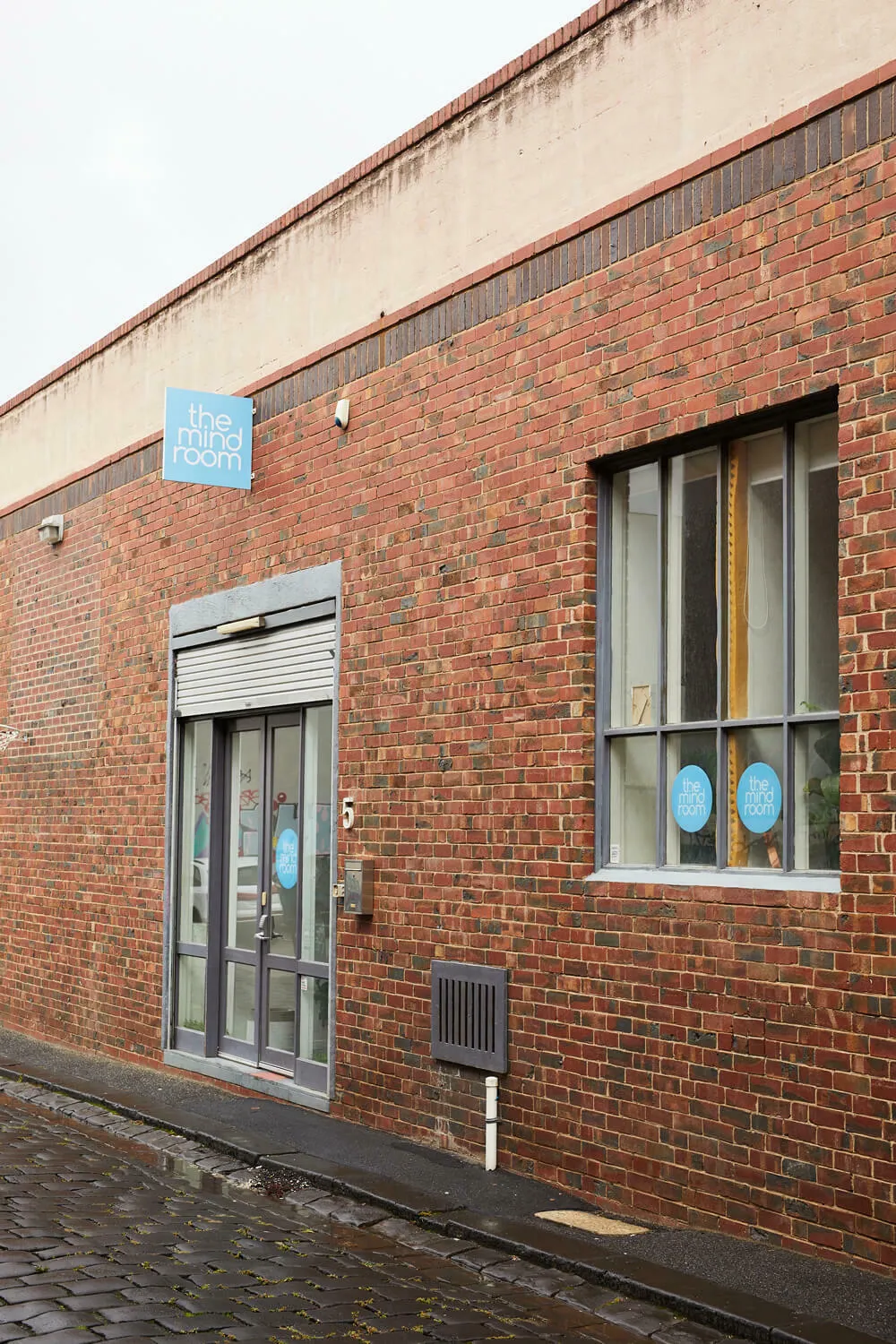
Tap to explore content
We're aware that you've given some public talks about digital resilience a few times. Are there any particular topics of concern that you see as new or emerging in relation to mental health and digital resilience?
I think the challenge we have with technology—I'm a total lover of technology, and probably an early adopter of technologies—is that we don't understand enough about the impact of it. We're never going to catch up, because it moves way faster than research can move to understand its impacts. Often when there's unknowns or uncertainty, people default to fear.
And then you get a whole lot of mis-messaging. The best example I can give of that is with coronavirus resulting in people buying up toilet paper, rice, and pasta. Humans are amazing at creating stories that come from a place of fear.
I think my key takeaway in terms of digital resilience is the same message I'd give to anyone around food, alcohol and exercise; it's about the dose. It's about getting the right amount of anything, and also that it's fit for purpose. Understanding what the technology is, why you're using it, and what you want from it.
Alcohol is a beautiful example; culturally alcohol is misused in so many ways in our society. Now, alcohol isn't necessarily the problem but the way we relate to it and use it is. And are some people in the community more susceptible to the impact of this? Absolutely.
We know the same thing with some types of technology. The obvious one would be social media, particularly for young women. As the brain's still developing, women or young girls tend to have more of a propensity towards internalising disorders—like anxiety—and social comparison is rife. Social media too young and too much does seem to be impacting the mental health trajectory of that population.
I’m not saying, “No social media ever in your life”, but think about when your kids have access to it, how they're using it, and talk to them. You've got to be in on the journey. Which I think a lot of the time as adults, we don't necessarily model the behaviour we want to see. Nor do we get in and understand what they're using and doing. It's kind of scary. It's easy to go, “No. Don't do that.” Or, alternatively, ignore it and let them do whatever they want to do.
Yeah, so it's either one extreme or the other. What do you think makes digital resilience so important?
For me, when I think of digital resilience, it implies that something's maybe gone too far and it's about how you bounce back. I think that we're seeing that happen with things like social media again, where people have just been mindlessly scrolling and noticing, “This has an impact on my sleep”. It’s really scary looking at some of the statistics around how many people take their mobile phone to bed and will reply when it pings in the night, or wake up and reach for it.
The resilience part is not that we've maybe got caught in that trap, but that we can notice the impact and go, “Okay, how am I going to come back from this? Using it in this way isn't great, so what do I need? I need more sleep, so no technology from this time at night, because I know it interferes with sleep quality. I need more social connection, so I’ll put the phone away when I’m out with friends.”
How can businesses—in the tech space particularly—work to support their teams more when it comes to digital resilience? We kind of touched on it there about people being constantly connected to work.
It's a big challenge. But we need to start by having a conversation about it, and for people to understand the actual impact on the brain and body that being switched on all the time creates. I was speaking to a bunch of tech startups and founders, and it was really fascinating. I'm showing them all this science around people actually needing a break, and they were saying, “But we've got a six-month window in this incubator to get everything up and going. We'll just work really hard 24/7 for this, and then we'll take a break.”
People keep doing that, and the break never comes, until we have burnout. Or we have other physical or mental health issues. I think we've got to be really realistic. You do not have a viable business if you cannot look after your wellbeing as well as hit the kind of productivity levels that you're looking for.
Generally, there is a vague commitment upfront that we're going to work really hard for a couple of months, really smash what we need to do, but then it just keeps on going. Obviously once that momentum starts, and the work comes in, it doesn't slow down.
It's like literally saying, “We are going to halve our workforce at this point because we're asking you to do half the amount of work.” It is so hard to pull yourself back. So again, part of the premise when we started The Mind Room was to acknowledge that all of us have worked in those environments, and to actually create an environment that is really contained. We don't expect by rule, people to stay late, and the people that are doing later evening sessions have started later in the day, or they're doing early and they finish earlier.
There is a reasonable expectation of what our contractors and employees can do. And if we can't meet it, it's okay if there are occasional bursts of more work, but if we can't meet it then that's asking us to take a look at the scenario and ask, “Well, what are we doing? We're asking too much. We might need to up the resources.”
I think too much of the time we rely on people's goodwill, and the Aussie work ethic. We have these cultural messages of, “Just soldier on, keep working”.
I think my key takeaway in terms of digital resilience is the same message I'd give to anyone around food, alcohol and exercise; it's about the dose. It's about getting the right amount of anything, and also that it's fit for purpose. Understanding what the technology is, why you're using it, and what you want from it.
Dr Jo Mitchell
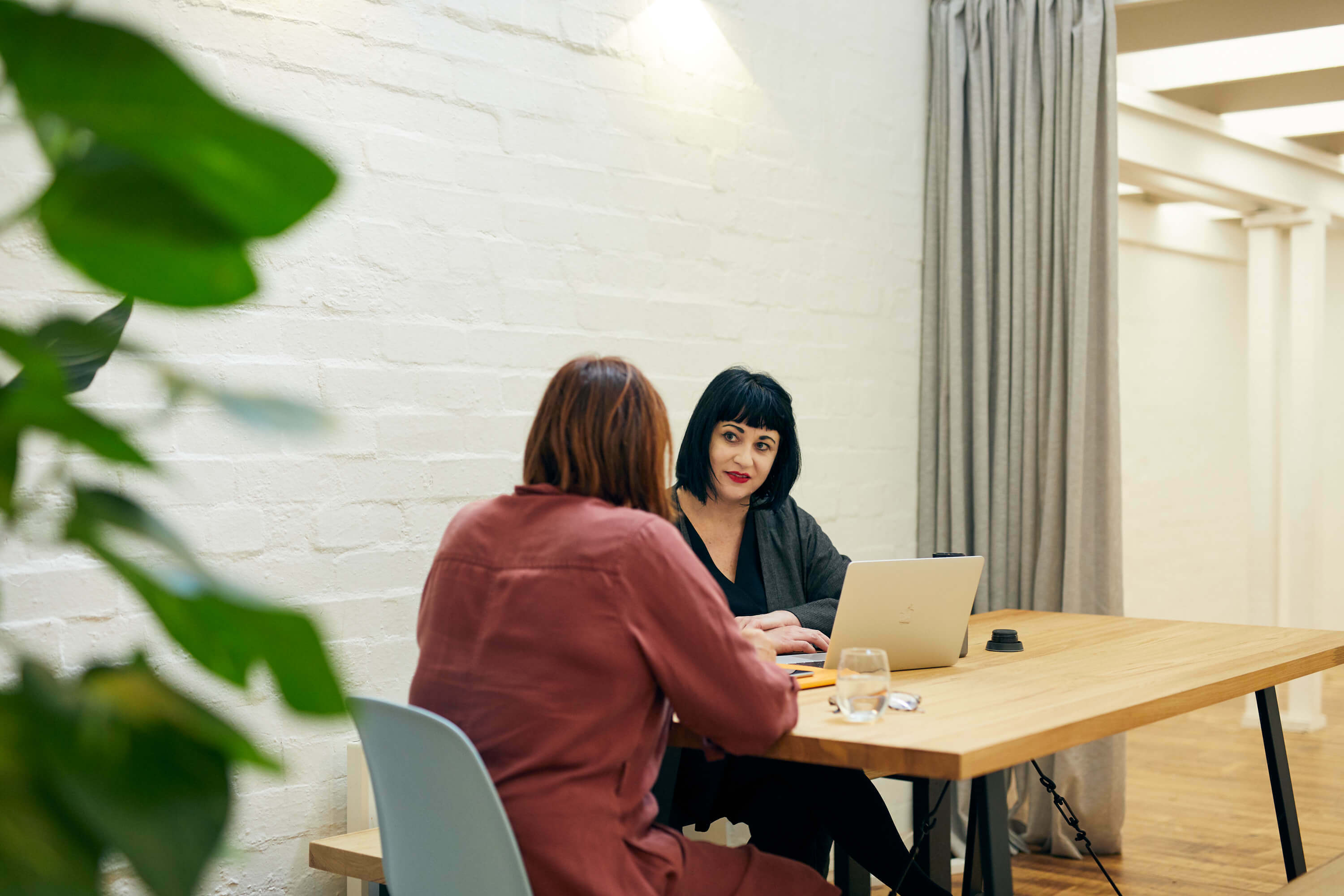
At Today, I think fairly similarly to The Mind Room, we do have peaks and troughs across the year, but we do acknowledge that there are the occasional long nights and weeks that do get really, really busy. We have such a strong culture of flexibility, so everyone is trusted to do their bit, but also to take the time out that they need. If there are long nights and a succession of them, we encourage people to take a day out or a couple of days out; whatever you need to be able to recover and recoup. It's good to know that we're doing the right thing.
Yeah, absolutely and I think the difference between the culture that’s talked about, and the real culture that's there, is where sometimes businesses fall down. There's a bit of a mismatch, or a bit of confusion, and even a little bit of resentment.
I agree, there will be resentment if it's not real and if what you say isn't actually true in terms of the working culture.
There is a lot of talk in the media in Australia, globally in fact, around resilience and burnout at the moment. I wondered if we could talk about reasonable steps that people can take to prevent this from occurring.
Burnout is a build-up of chronic workplace-related stress that makes you more liable to experience mental or physical health issues.
It's a coming together I guess of three things, and one is emotional and physical exhaustion. That's chronic exhaustion. You might identify with thoughts like, “I find it really physically hard or mentally hard to get up and go into work,” or maybe it might be, “work's okay at the moment, but I've got no energy for any other part of my life.”
The energy component or exhaustion component, is detachment or cynicism, which I think particularly if we're working in for-purpose sectors, that when that's been a real motivator for you, that, “I love what I do, I see real purpose in it,” to wake up and go, “Ugh, what's the point? What's it all about? I don't really care or feel passionate or motivated anymore,” that can be fairly significant for people.
The third part then is this sense of not achieving or accomplishing or making progress towards important goals.
When those things come together, and it's chronic—it's not just a day of it and then I'm okay—it's over multiple weeks. A pattern emerges and that's what we would call burnout.
What kind of behaviours are displayed when someone is going through that process of burnout?
I think you begin to see behavioural change in people. This person is normally always on time, meets their deadlines, comes in with a fairly upbeat or positive attitude and when you begin to see missing deadlines, a bit of that cynical attitude or not quite finishing things the way that they would do previously, it can show as irritability, anger or sadness.
Now, it could be a whole range of things other than burnout, but I think the first thing is to check in with people and not go to a solution, but just say, “What's happening?” Because they may not realise it, because again, sometimes it's this kind of slow burn, or slow boil that just heats up, and you don't realise that you're there until it's like, “Whoa, who am I and what am I doing? Why is this so hard, and why am I being so mean or just unmotivated?”
It is something that I think I've observed in my role over the years in HR. As you've said, you see behaviours change. You think, “That's not usual for this particular person.” You see the decline and then usually it's a big crash. It's usually involved with—from my experience anyway—a relationship breakdown. The person that's experiencing burnout has snapped at somebody, or is behaving in such an erratic and bizarre way that it's actually beginning to upset others. That's usually when the role of HR comes in and tries to understand and resolve the situation.
And that's exactly it. Somebody notices, and it's usually when it's got really bad. Rather than earlier when you might say, “You're not quite you and it's been multiple days and I can't really see an obvious reason. Let's check in.” I think we put a lot of the emphasis on the individuals. We all have to understand ourselves and understand perhaps when we are exhausted or tired, burned out, or when maybe our anxiety or worry is excessive or sadness is excessive. And we need to seek help in those times.
It comes back to, know your mind, know your body, and understand when it's giving you signals. We're often so bad at listening to the signals.
Yeah, we're all so busy. We just have a tendency to ignore them.
I think the difference between the culture that’s talked about, and the real culture that's there, is where sometimes businesses fall down. There's a bit of a mismatch, or a bit of confusion, and even a little bit of resentment.
Dr Jo Mitchell
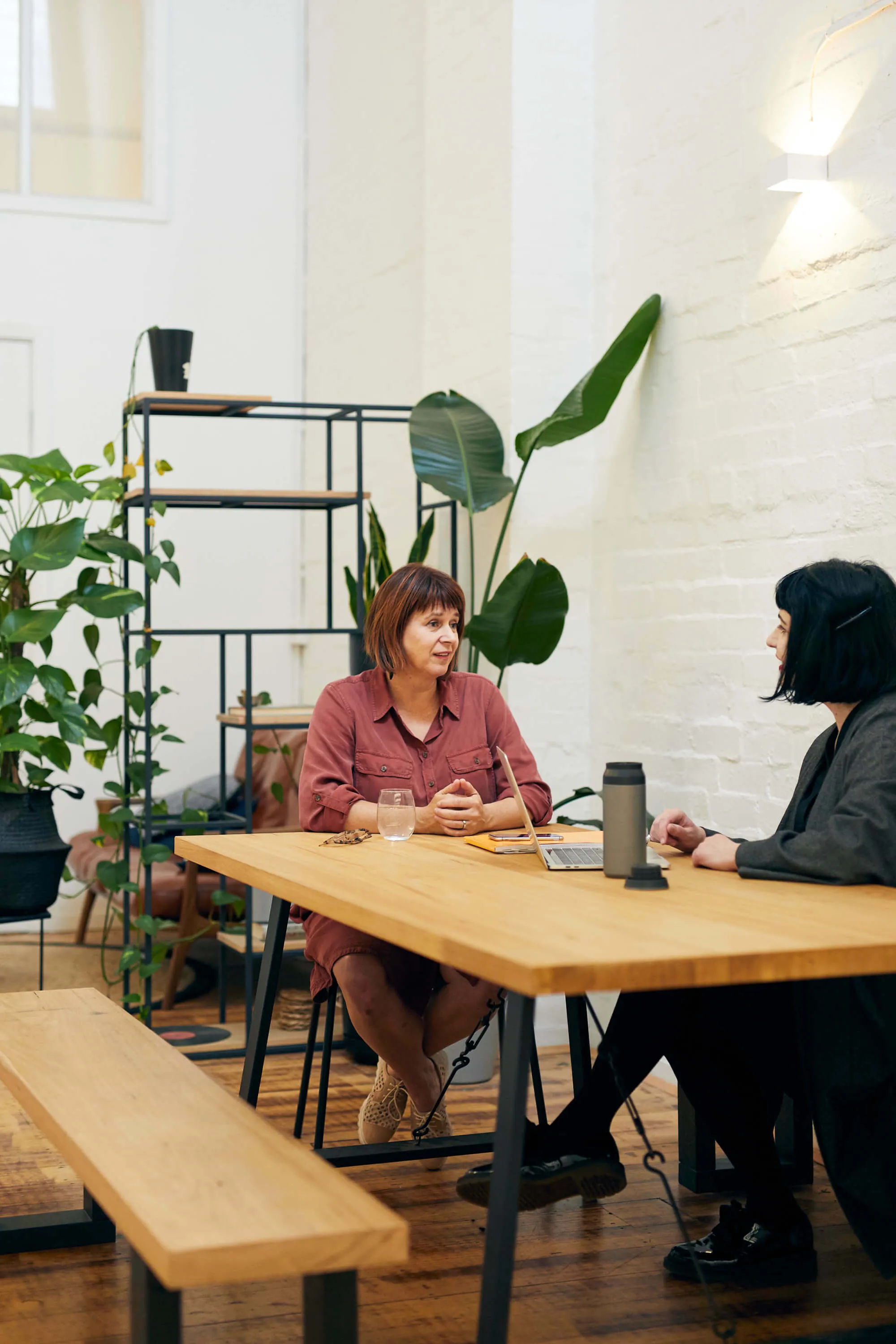
Tap to explore content
But why are we buying into that busy thing? Where does that come from? It's a badge of honour, isn't it? Like, “Oh, I'm really busy.”
Remember the Codral Cold ads to soldier on? You're turning up to work sick because you've seen it in our media messaging. I guess it comes from the Great Depression from harder times, and there’s a sense of, “This is tough, we've just got to keep going.”
For a lot of Australians, it's not so tough anymore. Some absolutely struggle, but for the majority of us, it's not too bad. And you're not meant to beat yourself up with thoughts of, “Other people have it worse than me.”
But it's not so bad that we need to keep working at this pace and pressure. I think we have to ask ourselves as a culture, how do we want to be? How do we reel it back? Because it's hard when you've set up a precedent of people working long hours, hard hours, and looking busy.
I think we have to ask ourselves as a culture, how do we want to be? How do we reel it back? Because it's hard when you've set up a precedent of people working long hours, hard hours, and looking busy.
Dr Jo Mitchell
What can organisations do to help in that space, to de-stigmatize words like burnout and resilience, and help people from reaching burnout? One of the points you mentioned was for businesses to be really proactive in just reaching out to people if they do see changing behaviour. What else can they do?
I think that there's a lot of organisational, structural, and process-level things that people can do. Often what causes workplace stress is either a poor job fit or job overload.
Things like how you advertise roles and actually make sure that people understand what their role is, and also what's the process if they’re unsure, uncertain, or unable to cope with this? Which comes back to relationships.
What we generally find is that people don't use the formal offer of services. They're more likely to chat to friends or family first than go to the official EAP program or some other service. Yes, you want to have those in place, but you also want to have the informal networks that people feel comfortable to talk about what's going on, and that that can be a constructive conversation, not just a big old whinge and feeling futile and doing nothing more.
Relationships and good people management are really key. I know we've really noticed in the growth of our business—going from being two of us to maybe 10 of us—where everything could be talked about and was really visible and clear; to then turning into a 30-person organisation where we can't just have myself and Michael, my business partner, across everything and everyone knowing what's going on. We needed to put in some other pathways and markers and key influencers as support.
We don't have it right. We're still finding our way, but we're aware and we're trying to catch up with the growth. I think looking at your systems and processes, writing good job descriptions, focussing on values-based recruitment, and culture is everything.
One of the first things we did was be really clear about what our values are. It's not something you pin up on the wall and you just read once. People should just be able to see from the things that we say and do, and the feel that you have when you walk into the place.
Recruiting based on values means we tend to have people that have the same outlook. I mean, we have diversity in background, thought and skills but there's a shared sense of knowing we care about our people, we're in this together, and we support each other. We work with hard issues, so how do we bring joy and lightness into what we do as well?
From an organisation perspective, you can see if your teams are working really long hours. And I think you really have a responsibility to step in and ask, “What's happening here?” Working harder or longer is not necessarily a long term solution to the issues that we have.
It’s important to have compassion for business owners as well, because you're constantly trying to weigh up the greater good with the individual good. You've got to be financially viable, even more so if you're a for-purpose business. You've got to take care of the financial stability, and everybody's security. I think we need to get away from the hierarchical and more towards a collaborative shared vision with shared values.
One of the first things we did was be really clear about what our values are. It's not something you pin up on the wall and you just read once. People should just be able to see from the things that we say and do, and the feel that you have when you walk into the place.
Dr Jo Mitchell
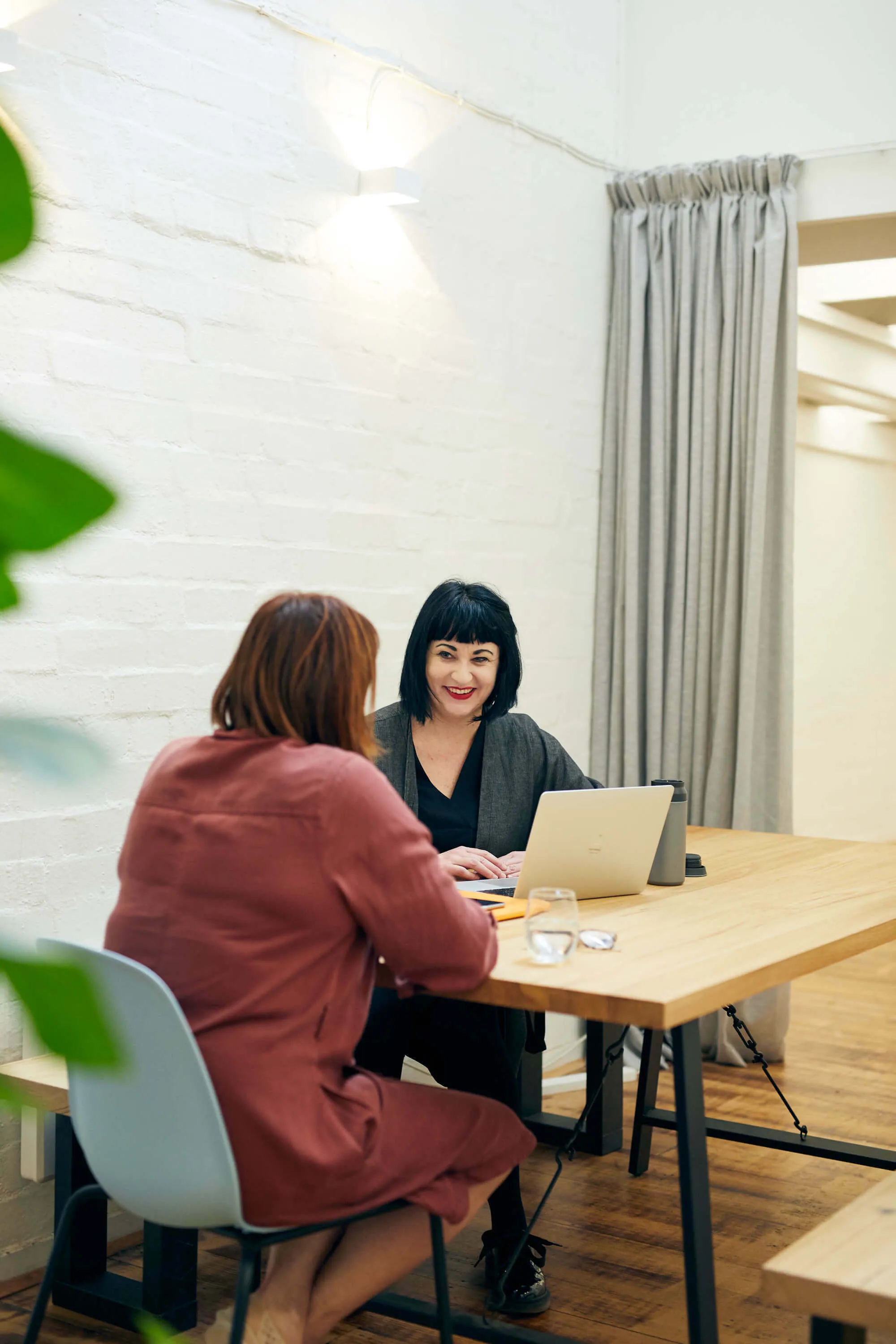
Tap to explore content
I really like that idea of keeping an eye on things. I think that's a really important point. Frameworks—like having values in place and recruiting against values—are so critical and important. But process is not everything, and it's still just about keeping your eye out on people and making sure that everything looks good and feels right.
When we are prioritising mental health, is the for-purpose sector more challenging for people than in other sectors?
I have thought a lot about this, and went back and went, “Okay, what's the for-purpose sector? What's different about the for-purpose sector? What's the same as any other sector?” I'd say that probably both the advantage and disadvantage is clarity of purpose, “This is something that really matters to me and I want to do this work, and we want to do this work.”
When you get that, that's an incredible motivating force, however, it can also make us really narrow in our attention and effort. What we know, is that when you don't have a diverse identity, that has more than just work in your life, that can have really poor outcomes on our health and wellbeing as well.
How does that manifest itself?
There's a lot of great research around this, but often it comes out in the form of mental health issues. We see the big crash of, “Who am I? What am I doing? What is my purpose if it's not that?” A lot of their self-worth is so tied up in it, so you see things like anxiety and depression and panic, and the likes.
I think it's a big advantage and it's a disadvantage, and I think the for-purpose sector often implies that there is a scramble for resources. There’s going to be challenges of, “Do we have the resources to do the job, both financially, practically, internally? Do I have what I need to turn up?”
I couldn't actually see any strong data that suggested that this cohort had really been studied, and that the health and wellbeing was any worse or any better. But I think in the end, it's all about having a purpose, but also have other things in your life. Don't just be all about the one thing.
That's really good advice for individuals. Again, from an organisational point of view, if your business is in the for-purpose sector, how should they effectively support those people who are very purpose-driven individuals?
Thank you for asking me, and I'm not sure I'm the best person to be giving advice on that. However, what it makes me think about is when I was doing my PhD, which is a very narrow focus process, some of the best advice I got was from an American researcher, a professor, who just said, “Read more widely than what you're doing now. Get diversity in what you're doing.” Some of the best business people, academics, and people from a whole range of industries look outside their space. They're open to other perspectives, they're open to being challenged, and also can see a little more clearly because of it.
Even taking a holiday from work can have this effect. Get outside of your bubble. Because so often, the for-purpose businesses can exist in a real bubble, and you're just so intently focused on it, that you lose perspective.
Help people to step out of the bubble, to keep on learning, growing, be exposed to other ideas, and to take breaks.
Well, thank you, Jo. That’s the end of my questions. Is there anything else that you'd like to add?
You're very welcome. On our website, we have blog articles on things like burnout and rest and rejuvenation, and ways to wellbeing. If people are interested, then it's probably a nice place to go, have a look.
Okay, what's the for-purpose sector? What's different about the for-purpose sector? What's the same as any other sector?’ I'd say that probably both the advantage and disadvantage is clarity of purpose, ‘This is something that really matters to me and I want to do this work, and we want to do this work.’ When you get that, that's an incredible motivating force, however, it can also make us really narrow in our attention and effort.
Dr Jo Mitchell
